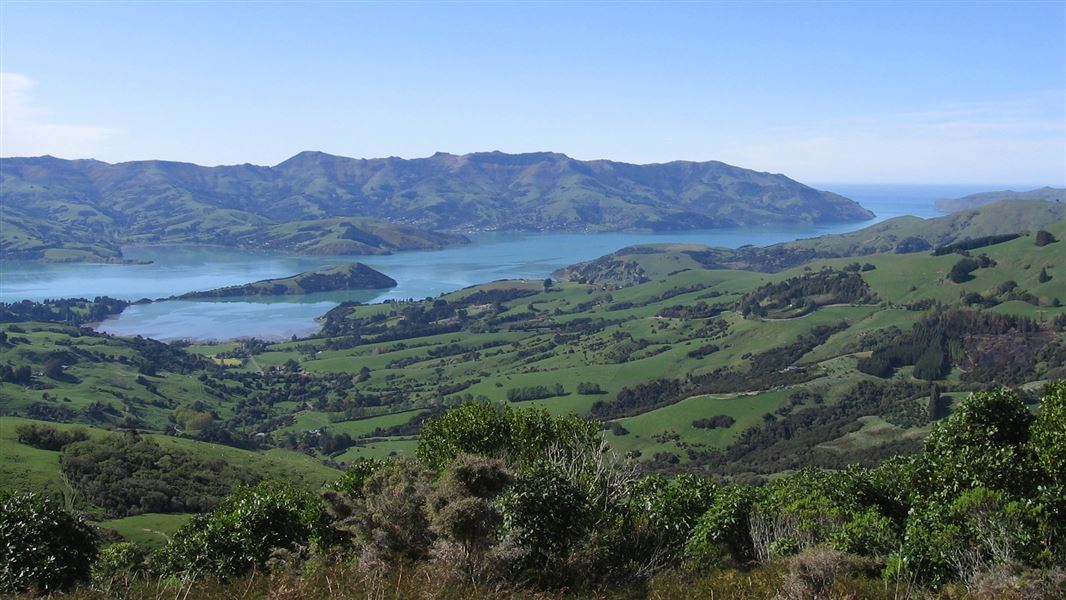See rare Hectors dolphins, take a short bush walk, or tackle a more challenging day or overnight tramp as you explore its extensive coastline, steep volcanic landscape and historic townships.
Visit Akaroa Heads for remains from the time a lighthouse stood on the headland, Pohatu Marine Reserve or Akaroa Marine Reserve for their many marine mammals, or Horomaka Island.
Banks Peninsula is near Christchurch on the east coast of the South Island. Its many reserves are scattered all over the peninsula and best accessed by car.
Akaroa, 83 km from Christchurch is situated on the edge of a deep harbour. Allow 1.5 hours driving as the Christchurch to Akaroa Highway climbs and turns steeply.
The roads on Banks Peninsula are winding, steep, narrow and not all are sealed. Some are four-wheel drive only. Parking is limited for some reserves. Drive cautiously.
Pick-ups and drop-offs near the ends of the Summit Walkway can be arranged through the two local bus services.
There are two bus services to Akaroa: Akaroa Shuttle (0800 500 929) and French Connection (+64 3 366 4556).
Maps
The NewTopo map “Banks Peninsula Port Hills and Te Ara Pātaka” (1:65 000) gives good coverage of the whole area. For greater detail the Topo50 maps BX24 Christchurch, BX25 Duvauchelle, BY24 Birdlings Flat and BY25 Akaroa together cover the whole of Banks Peninsula.
Take care near stinging nettle
Urtica ferox (ongaonga) is an endemic stinging nettle and common in this area. Take care not to touch these plants as they have a very strong sting. Ongaonga are an important host plant of Vanessa gonerilla (kahukura), the endemic red admiral butterfly.
Banks Peninsula was formed over six million years ago, following the violent eruptions of two volcanoes. Craters form the harbours of Lyttelton and Akaroa with many smaller bays indenting the coastline.
The original Banks Peninsula forest had similar plants 20,000 years ago as we find today. Much of the remaining forest was felled or burned during the first 50 years of European occupation.
Forest remnants provide refuges for native forest birds, including bellbird/korimako, wood pigeon/kererū, silvereye, pūkeko, fantail/pīwakawaka, tomtit/miromiro, grey warbler/riroriro, riflemen/tītitipounamu, and brown creeper/pīpipi.
A marine mammal sanctuary around Banks Peninsula protects the rare Hector’s dolphin/upokohue, while the Akaroa Marine Reserve and nearby Pohatu Marine Reserve in Flea Bay protect marine sea-life. Visit Akaroa Marine Reserve and Pohatu Marine Reserve.
Maori
Banks Peninsula is commonly known to Maori as Horomaka. It's also known as Te Pataka o Rakaihautū, meaning the storehouse of Rakaihautū, who was a legendary explorer.
Waitaha, Ngāti Mamoe and Ngāi Tahu all lived in or moved through the area. By 1820 Ngāi Tahu had many settlements and pā around the peninsula. In the 1820’s fighting between hapū (family groups) began. Known as the Kai Huanga feud, it continued until the threat of Te Rauparaha in the early 1830’s brought the families back together.
Europeans
In 1840 French settlers arrived at Akaroa, which had just been claimed by the English under the Treaty of Waitangi. As the site of the only attempted settlement by the French in New Zealand, Akaroa is unique.
Some of the first European settlements in Canterbury were whaling stations.
World War II
Five concrete structures on the hilltop east of Tauhinukorokio/Mt Pleasant represent a command post and four gun positions. They are the remains of a World War II (1939-1945) Heavy Anti-aircraft Artillery (HAA) battery. Read about Tauhinukorokio/Mt Pleasant Heavy Anti-aircraft Artillery Battery.
Arthur's Pass National Park Visitor Centre
| Phone: | +64 3 318 9211 |
| Email: | arthurspassvc@doc.govt.nz |
| Address: | 104 West Coast Road Arthur's Pass 7654 |
| Hours: | Visitor centre hours and services |
